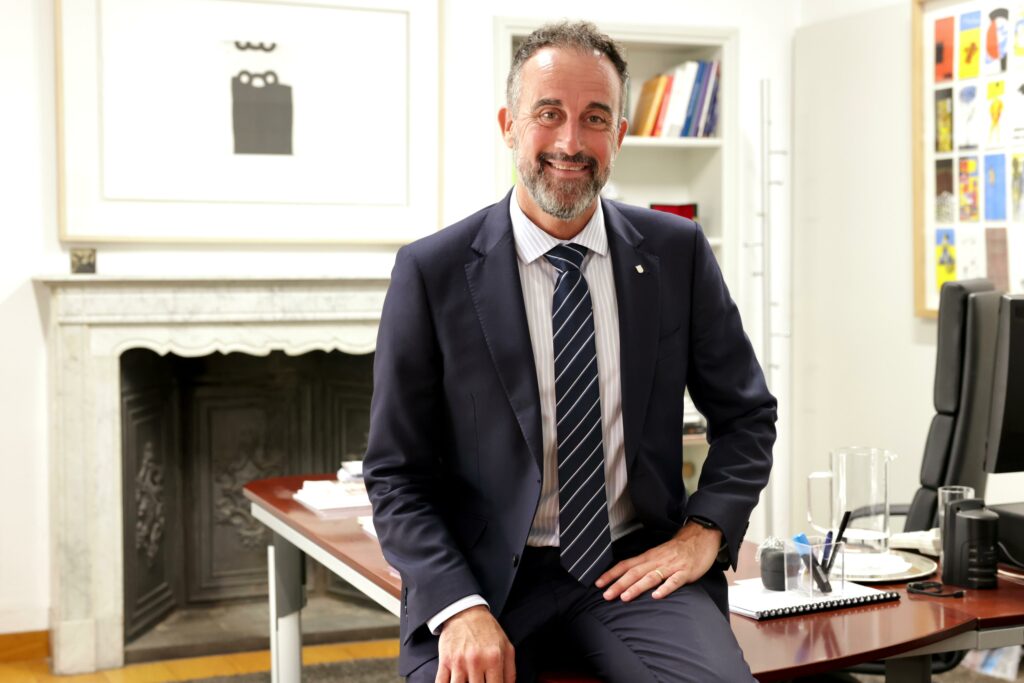“Today more than ever, we need innovative solutions that will benefit citizens”
Interview with José Luis Mateo, Councillor of Housing, Territory and Mobility of the Government of the Balearic Islands
Greetings and kind thanks for your attention
Thank you. At the “Buades Legal” law firm, with which I have had the opportunity to work on a joint basis and collaborate through the Faculty of Law of the Universitat de les Illes Balears (UIB), in the Legal Oratory competition which celebrated its 7th edition on 3rd of May.
Now, based on my duties as Councillor of Housing, Territory and Mobility of the Government of the Balearic Islands, it is an honour that you have contacted me to outline the work initiatives that we are implementing by the Council and the challenges essentially related to housing and mobility.
Due to your long career as a Corporate Law professor, as well as holding different posts of responsibility at the Faculty of Law in the UIB, what helps you when focusing on the projects and adversities that are currently faced at the Council of Housing, Territory and Mobility of the Government of the Balearic Islands?
At the Council of Housing, Territory and Mobility, we prioritise the needs of the residents of the Balearic Islands, such as key improvements in transport services or how they can purchase a house at affordable prices.
With regards to housing, after one year of price increases and a housing shortage, we must work on new measures and programmes to provide effective solutions for this problem. We must provide security and increase the supply. We must create more houses at affordable prices for the residents of the Balearic Islands by working on new public housing development projects with the collaboration of the private sector to define the public-private collaboration initiatives.
In reference to mobility, we are working hard to provide solutions and improvements with a clear investment in sustainable mobility. The number of public transport users has risen in recent years. Our aim is to continue to improve this sector, to reinforce the work staff in order to manage this growth in frequency and timetables, as well as guarantee the safety and improvement of the infrastructures.
In relation to territory, at this time the Government is working on a new Urban Planning Law for the Balearic Islands, with the aim to establish clearer and more simple regulations adapted to the current reality, which simplify and speed up the procedures, which facilitate revision and changes in the plans, at the same time, ensuring the adaptation of the urban planning ordinances, the territorial sectors and planning instruments, so that municipalities can exercise their urban planning competencies in the most effective way.
Likewise, we are working on the first Cartography Act of the Balearic Islands that will allow us to have a more organised, cohesive and coordinated mapping system among all the public administrations. This new law will be essential to make key decisions in territorial planning and development matters.
We are also developing technical planning standards, which have the aim to normalise the aspects related to the structure, content and format of the documents that comprise the planning instruments, through the standardisation of the cartography, the general urban planning terminology and concepts, with the objective to reduce the degree of discretionality, simplify the processing and facilitate integration in the urban planning information system of the Balearic Islands.
What are the main challenges that you face in your post at this time, both in reference to housing as well as mobility and territory? How do you plan to focus your work projects in the next few years?
At the Council of Housing, Territory and Mobility, we prioritise the needs of the residents of the Balearic Islands, such as key improvements in transport services or how they can purchase a house at affordable prices.
With regards to housing, after one year of price increases and a housing shortage, we must work on new measures and programmes to provide effective solutions for this problem. We must provide security and increase the supply. We must create more houses at affordable prices for the residents of the Balearic Islands by working on new public housing development projects with the collaboration of the private sector to define the public-private collaboration initiatives.
In reference to mobility, we are working hard to provide solutions and improvements with a clear investment in sustainable mobility. The number of public transport users has risen in recent years. Our aim is to continue to improve this sector, to reinforce the work staff in order to manage this growth in frequency and timetables, as well as guarantee the safety and improvement of the infrastructures.
In relation to territory, at this time the Government is working on a new Urban Planning Law for the Balearic Islands, with the aim to establish clearer and more simple regulations adapted to the current reality, which simplify and speed up the procedures, which facilitate revision and changes in the plans, at the same time, ensuring the adaptation of the urban planning ordinances, the territorial sectors and planning instruments, so that municipalities can exercise their urban planning competencies in the most effective way.
Likewise, we are working on the first Cartography Act of the Balearic Islands that will allow us to have a more organised, cohesive and coordinated mapping system among all the public administrations. This new law will be essential to make key decisions in territorial planning and development matters.
We are also developing technical planning standards, which have the aim to normalise the aspects related to the structure, content and format of the documents that comprise the planning instruments, through the standardisation of the cartography, the general urban planning terminology and concepts, with the objective to reduce the degree of discretionality, simplify the processing and facilitate integration in the urban planning information system of the Balearic Islands.
One of the issues that most concern the citizens in the Balearic Islands is the housing shortage and rising prices. What measures have this Government implemented to solve these problems?
On day one, this Government has worked to alleviate the current situation by means of different measures and programmes with the aim to launch houses on the market at affordable prices.
With the shock plan announced by the President of the Government, in the first phase, it is estimated that more than 7,000 houses will be built with prices that are affordable for the Balearic Islands’ citizens.
In the short term with the “Lloguer Segur” programme presented a few days ago, we expect for new houses to be launched on the market.
This programme was implemented in November and its aim is to provide incentives to increase the supply of empty houses in the market and provide security for the owners and tenants to offer these houses at a reduced price for residents.
We expect that these houses, whose terms to join this programme are that they must be in good condition so that they can be immediately leased, can be released in the market this year.
In relation to the implementation of the Law Decree of urgent measures to facilitate access to affordable housing, approved as a law in Parliament, the forecast is that starting this year or next year, it will be possible to sell or lease houses at a limited price for the premise reconversion and housing partition projects, since they do not involve newly built housing works which generally require a longer execution time.
In the mid- and long-term, houses have been planned in new IBAVI property developments with approximately 600 houses, as well as the remaining measures of the decree and the development of the “Construir per Llogar” programme, with the assignment of public land for these private ventures.
We have also implemented a new Housing Act which aims to regulate and improve the procedures of the current law and promote measures that facilitate access to housing at affordable prices, thus enhancing public-private collaboration, with measures that can reduce illegal occupancy with a clear investment to provide incentives and avoid interventionist measures.
Another one of the projects that we are developing and which I would like to highlight is the founding of the Housing Observatory of the Balearic Islands, a historical demand from the sector which will make it possible to collect data about the real housing situation on the islands for their expert analysis and communication. It will provide support to public and private agents when they must make key decisions.
And if we focus on mobility issues, what improvements have been carried out at this time and what is the Government’s road map in this matter?
Considering the major growth of users that we have recorded in recent years, the Government has been working on different improvements in the Interurban TIB public transport network (buses, train and metro).
There are additional actions to improve public transport, infrastructures and the current network. We are working on safety, lighting, cleaning of SFM stations well as the elimination of ground-level crossings.
We have made progress to improve and develop the TIB bus networks, with reinforcements in winter, 27 lines in November 2023, as well as the summer season, with a new line in the Tramuntana mountain district and improvements in 24 lines since March 2024. At SFM, we have initiated frequency improvements and others are in the planning phase.
On the other hand, the extension works continue for the Palma metro system from the University (UIB) up to Parc Bit. We are currently in the last phase at this time.
We are also working to expand the fleet and staff. 10 new buses have already been included in the TIB network, and we have received 5 new trains to reinforce the SFM fleet and work is under way to increase the railway company personnel.
Soon an agreement will be submitted for approval by the Governing Council to amend the TIB bus concessions in Mallorca, in order to adapt the network to the growth in users. In summary, this represents a budget increase of the concession contracts amounting to approximately 150 million euros (from 436 to 580), with a 50% increase in the supply of bus transport in relation to what was included in the contracts as well as the incorporation of 27 buses.
Several weeks ago, we submitted the Palma-Llucmajor train plan, which has begun its public exhibition at this time. It is a line that will connect Palma and Llucmajor in 28 minutes; Palma with the airport in 11 minutes; Palma to the Hospital of Son Llatzer in 6 minutes and Llucmajor to the airport in 17 minutes.
In the upcoming years, how do you feel about exclusively returning to teach your classes or your vocation to public service?
As Seneca elegantly stated: ‘’You must continue learning until the end of your life’’. And this is what I foresee for myself in the next few years; my desire to learn will never cease. This is the key; this is what keeps us alive and gives us the strength to get up every day.
I am a family person. The family is my centre and it is what is most important, however, work is also essential, hence every day allows us to achieve our potential based on a professional perspective.
I feel joy because during my professional career of over 20 years, I have never stopped learning from my students, my friends and my work colleagues; as well as last year in the Parliament of the Balearic Islands jointly with the magnificent professional team at the Council. I have never stopped learning and taking good notes. In fact, I have always believed that just by surrounding oneself with people who are better than you, you can make major decisions, in this case, to improve the lives of our Islands’ citizens.
On the other hand, it is quite daring to discuss politics or talk about the future, to say the least. However, what I can confirm on today’s date is that I hope to respond in a better way and be worthy of the trust that the President of the Government of the Balearic Islands has placed in me. Our President, Marga Prohens, has entrusted me and my team to fulfil the objectives of this legislative session and as long as I maintain this trust, I do not think about anything else. I do not think beyond that. We are all focused on fulfilling the promises that we have made to the citizens of our Islands.
And when I return to the University, I will enter this classroom again, in this office in this Gaspar Melchor de Jovellanos building with the same enthusiasm as on the first day. And I will continue insisting to my students. I will ask them to keep asking questions, to open their minds, to search for their paths, and in the last instance, I want them to be happy.
Otherwise, talking about the future is to talk about uncertainty, doubt and insecurity. And to a degree this is true. We never know what may happen or what we can do to take advantage of what surrounds us. Nevertheless and being aware of our painfully obvious limitations, life deserves that we do not wait for things to happen but we must be able to create the things that happen to us. Life demands that we be brave and abandon our comfort zones and to do our absolute best in everything that we endeavour. To sum up as the philosopher and thinker Peter Drucker said, “The best way to predict the future is to create it”.






































